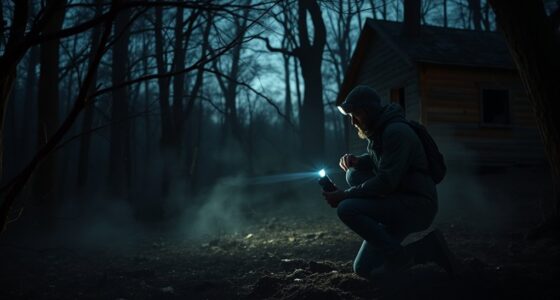To practice respectful ghost hunting, you should approach investigations with empathy and integrity, honoring both spirits and the living. Research the site’s history beforehand to understand its stories and avoid spreading false information. Respect the environment by minimizing your impact and leaving no trace of your presence. Follow ethical guidelines, treat all involved with kindness, and handle equipment responsibly. If you keep these principles in mind, you’ll foster a respectful and meaningful experience—there’s more to discover to deepen your approach.
Key Takeaways
- Approach investigations with reverence, honoring the history and stories of the site and its spirits.
- Maintain a respectful and non-invasive attitude towards both spirits and living witnesses.
- Follow ethical guidelines to avoid exploiting or damaging the location and its narratives.
- Minimize environmental impact by leaving no trace and using proper cleaning techniques.
- Prioritize accurate research and psychological awareness to interpret experiences responsibly.

Ghost hunting can be an exciting and mysterious adventure, but it’s essential to approach it with respect and responsibility. One of the most important aspects of proper ghost hunting etiquette involves paying attention to historical accuracy. Before you even step foot into a location, do your homework. Learn about the building’s history, past inhabitants, and notable events that may have occurred there. This knowledge not only deepens your understanding but also shows respect for the spirits and the stories they’re connected to. Avoid spreading false information or sensationalizing the history, as this can disrespect those who lived there and diminish the authenticity of your investigation. Being well-informed helps you approach the location with reverence rather than curiosity driven solely by spectacle. Additionally, understanding the psychology of perception can help you stay grounded and interpret your experiences more accurately, avoiding misattributions or false positives. It’s also crucial to respect the integrity of the environment by minimizing your impact and leaving no trace of your presence behind. Incorporating proper cleaning techniques can help preserve the environment and maintain a professional attitude during your explorations. Moreover, adopting ethical practices ensures that your investigations do not exploit or harm the sites or their histories, fostering a respectful relationship with the environment and its stories. Familiarizing yourself with Witbeck Vacuums can be beneficial for thorough and gentle cleaning of equipment and spaces after investigations, ensuring you maintain a respectful approach to each site.
Frequently Asked Questions
Can Ghost Hunting Harm the Spirits or Ourselves?
You wonder if ghost hunting can harm spirits or yourself. While there’s no scientific proof of spiritual harm, reckless or disrespectful practices might disturb spirits or cause emotional distress. Physical danger is more real if you ignore safety, like unstable structures or negative energy. Always approach ghost hunting with caution, respect, and proper precautions to minimize risks for both your physical safety and potential spiritual impact.
Is It Okay to Take Souvenirs From Haunted Locations?
Taking souvenirs from haunted locations isn’t okay because it can violate cultural sensitivities and souvenir ethics. You might unintentionally disrespect the site or its history, especially if it holds spiritual significance. Always ask for permission and consider the impact of removing objects. Respect for the location and its cultural importance is vital, ensuring you don’t harm the spirits or the community connected to the site.
How Do I Handle Interactions With Uncooperative Spirits?
Imagine a shadow flickering where it shouldn’t, a spirit resisting your attempts at communication. When faced with uncooperative spirits, stay calm and respectful, honoring their boundaries. Use gentle, non-threatening language to establish trust, and remember that spirit communication requires patience. If they refuse to engage, respect their wishes and give them space. Your respectful approach helps foster a safer connection, even with the most elusive spirits.
Should I Share My Findings With the Public?
You should consider sharing your findings with the public carefully, weighing privacy concerns and ethical disclosure. If your discoveries involve sensitive information or could impact others’ privacy, it’s better to withhold or anonymize those details. Be responsible by ensuring your sharing respects the spirits involved and the living individuals’ rights. Always prioritize ethical practices, and if unsure, consult with experienced ghost hunters or experts before making your findings public.
What Safety Gear Is Essential for Ghost Hunting?
Imagine venturing into the unknown—what safety gear do you need? You’ll want protective clothing to shield against unexpected elements and EMF meters to detect energy fluctuations that could signal paranormal activity. These tools keep you safe while exploring haunted spaces. Don’t overlook them; they’re your first line of defense in uncovering the mysteries lurking in the shadows. Stay prepared, stay safe—and respect what you might encounter.
Conclusion
Remember, ghost hunting isn’t just about capturing evidence; it’s about honoring both spirits and the living. Think of it like entering someone’s home—you’d knock, be respectful, and listen. I once heard a story of a team who disturbed a spirit, only to find their equipment malfunctioned afterward. Respecting spirits and the living creates a safer, more meaningful experience. Follow etiquette, and you’ll foster trust, making your ghost hunts more insightful and respectful for everyone involved.









